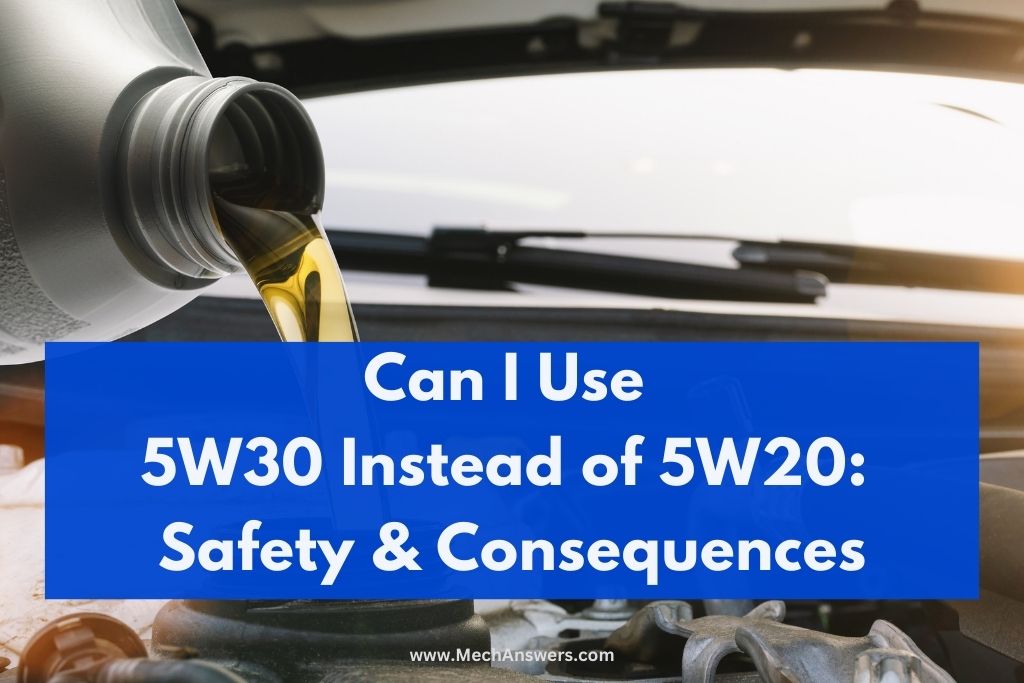You may ask yourself, perhaps even searching for “Can I Use 5W30 Instead Of 5W20?”, haven’t you? Well, search no more. This article aims to provide an insightful analysis of these two types of oil, their similarities, differences, and possible effects on your vehicle.
So, can you use 5W30 instead of 5W20? While both are types of multi-viscosity oils and may seem interchangeable, the answer isn’t that straightforward. While using 5W30 oil instead of 5W20 in certain situations might not cause immediate damage, it can affect your engine’s efficiency and fuel economy, and may even lead to potential long-term issues.
By reading this article, you’ll gain a deeper understanding of motor oil viscosity, what the numbers mean, and how using the correct oil can significantly influence your vehicle’s performance and longevity.
Table of Contents
Understanding Oil Viscosity and Ratings
Using 5W30 oil instead of 5W20 can impact engine performance and longevity. While both are suitable for different conditions, understanding their viscosity ratings is crucial for maintaining engine health.
Overview of Topics
- Understanding the Viscosity Ratings: 5W30 vs 5W20
- The Role of Oil Viscosity in Engine Health
- Potential Consequences of Using 5W30 Instead of 5W20
- Best Practices for Selecting the Right Engine Oil
Understanding the Viscosity Ratings: 5W30 vs 5W20
Motor oils are graded based on their viscosity, which is essentially their thickness and fluidity. Ratings like 5W20 and 5W30 indicate how the oil flows at different temperatures.
The first number (5W) represents the oil’s flow at cold temperatures (the ‘W’ stands for winter), and the second number (20 or 30) indicates the oil’s flow at engine operating temperatures.
- Key Point: The ratings 5W20 and 5W30 refer to the oil’s viscosity at different temperatures, crucial for optimal engine performance.
The Role of Oil Viscosity in Engine Health
Oil viscosity is vital for maintaining engine health. Thicker oils (higher viscosity) protect engine parts better at high temperatures but may cause increased friction at lower temperatures.
Conversely, thinner oils (lower viscosity) are better for cold starts and reduce friction, but may not offer adequate protection at high temperatures.
- Key Point: Choosing the right oil viscosity is essential for balancing protection and efficiency in different engine operating conditions.
Potential Consequences of Using 5W30 Instead of 5W20
Using 5W30 oil in an engine designed for 5W20 can lead to various issues. While 5W30 may provide better protection at higher temperatures, it could also result in increased oil consumption, reduced fuel efficiency, and potential harm to the engine’s components due to the thicker oil’s inability to flow as easily in colder conditions.
- Key Point: Selecting 5W30 instead of 5W20 can lead to reduced efficiency and potential engine damage, especially in colder conditions.
Best Practices for Selecting the Right Engine Oil
To ensure engine longevity and optimal performance, it’s crucial to follow the manufacturer’s recommendations for oil viscosity. Regular oil changes, using quality oils, and understanding the specific needs of your vehicle based on its operating conditions and environment are also key factors.
- Key Point: Adhering to the manufacturer’s guidelines and understanding your vehicle’s requirements are crucial for selecting the appropriate engine oil.

The Differences Between 5W30 and 5W20
Understanding the differences between 5W30 and 5W20 oils is key to ensuring optimal engine performance and longevity. These oils vary in their behavior at different temperatures, which can significantly impact engine health.
Overview of Topics
- Composition and Properties of 5W30 and 5W20 Oils
- Performance in Various Temperature Conditions
- Suitability for Different Engine Types
- Impact on Engine Wear and Efficiency
Composition and Properties of 5W30 and 5W20 Oils
Both 5W30 and 5W20 oils are designed to perform in a range of temperatures, but they have different viscosities. 5W30 oil is thicker than 5W20, providing better lubrication at higher temperatures. This makes it suitable for engines operating under heavier loads or in hotter climates.
- Key Point: The thicker 5W30 oil offers better protection in high-temperature conditions compared to the thinner 5W20.
Performance in Various Temperature Conditions
The performance of these oils varies significantly across temperature ranges. 5W20 oil, being thinner, flows more easily during cold starts, reducing wear and tear during the initial engine start-up. In contrast, 5W30 provides more consistent protection at higher temperatures, making it a better choice for sustained high-temperature operations.
- Key Point: 5W20 oil is preferable for colder climates due to its lower viscosity, while 5W30 is better suited for higher-temperature operations.
Suitability for Different Engine Types
Different engines are designed for specific oil viscosities to ensure optimal performance and longevity. Engines designed for 5W20 oil may not perform as efficiently with 5W30 oil, as the thicker oil can cause increased resistance, reducing fuel efficiency and engine responsiveness.
- Key Point: Using the manufacturer-recommended oil viscosity is crucial for maintaining engine efficiency and avoiding potential damage.
Impact on Engine Wear and Efficiency
Using the wrong oil viscosity can lead to increased engine wear and reduced efficiency. For example, using 5W30 instead of 5W20 can lead to slower oil circulation at startup, increased fuel consumption, and potential buildup of oil sludge.
- Key Point: The right oil viscosity is vital for reducing engine wear and maintaining optimal fuel efficiency.
Can You Use 5W30 Instead of 5W20?
Switching from 5W20 to 5W30 oil in your engine can have varied impacts, ranging from negligible to significant, depending on the engine design. It’s crucial to understand both the short-term and long-term effects of such a change on engine performance and health.
Overview of Topics
- Safety Considerations When Switching Oils
- Short-Term Effects on Engine Performance
- Long-Term Implications for Engine Health
- Making an Informed Decision
Safety Considerations When Switching Oils
When considering a switch from 5W20 to 5W30 oil, safety is a primary concern. The immediate safety risks are generally low, but the wrong oil can compromise engine protection. Understanding your engine’s design and the manufacturer’s recommendations is essential for maintaining engine safety and performance.
- Key Point: Always prioritize engine safety by adhering to manufacturer recommendations when considering a switch in oil viscosity.
Short-Term Effects on Engine Performance
The short-term effects of using 5W30 instead of 5W20 can be noticeable, especially in terms of engine response and fuel efficiency. Thicker oil may cause the engine to work harder, particularly during cold starts, leading to a slight decrease in fuel efficiency and responsiveness.
- Key Point: Be aware of the immediate changes in engine performance, including potential decreases in fuel efficiency and responsiveness, when switching to a thicker oil.
Long-Term Implications for Engine Health
In the long run, using 5W30 oil in an engine designed for 5W20 can lead to increased wear and tear. The thicker oil might not circulate as efficiently in tight spaces, leading to inadequate lubrication and increased friction over time, potentially shortening the engine’s lifespan.
- Key Point: Consider the long-term impact on engine health, as the wrong viscosity oil can accelerate wear and reduce the engine’s overall lifespan.
Making an Informed Decision
When deciding whether to use 5W30 oil instead of 5W20, it’s important to weigh the pros and cons carefully. Consult with a trusted mechanic or refer to your vehicle’s manual for guidance. Understanding the specific needs of your engine and the operating conditions you commonly face will help you make the best decision for your vehicle.
- Key Point: Consult professional advice and thoroughly understand your engine’s requirements before deciding on an oil viscosity change.

Impact on Engine Longevity and Performance
Using 5W30 oil instead of 5W20 can have significant implications on engine longevity and performance. This change can affect engine wear and tear, as well as fuel efficiency, impacting the overall health and efficiency of the engine.
Overview of Topics
- The Impact of 5W30 on Engine Wear and Tear
- Fuel Efficiency Considerations
- Long-Term Engine Health and Maintenance
- Balancing Performance and Protection
The Impact of 5W30 on Engine Wear and Tear
One of the primary concerns when using a thicker oil like 5W30 in an engine designed for 5W20 is the potential increase in engine wear and tear. Thicker oils can create more resistance in the engine, especially during cold starts, leading to increased wear over time. This could potentially shorten the engine’s lifespan.
- Key Point: Be aware of the increased engine wear and tear associated with using a thicker oil like 5W30, especially in engines designed for thinner oils.
Fuel Efficiency Considerations
When it comes to fuel efficiency, the choice of engine oil plays a significant role. Using 5W30 oil in an engine designed for 5W20 can lead to a decrease in fuel efficiency. The thicker oil requires more energy to circulate, which can result in higher fuel consumption.
- Key Point: Consider the potential decrease in fuel efficiency when using 5W30 oil in an engine that is designed for 5W20.
Long-Term Engine Health and Maintenance
The long-term health of an engine is closely tied to the type of oil used. Regular use of an oil with a higher viscosity than recommended can lead to buildup and sludge, compromising the engine’s long-term health. This makes routine maintenance and oil changes even more crucial.
- Key Point: Prioritize engine health by choosing the correct oil viscosity and adhering to regular maintenance schedules.
Balancing Performance and Protection
Ultimately, the decision to use 5W30 instead of 5W20 involves balancing performance against protection. While 5W30 may offer better protection in certain conditions, it may also compromise performance and efficiency in engines designed for 5W20. Careful consideration of the engine’s requirements and operating conditions is essential.
- Key Point: Balance the need for engine protection with performance requirements when choosing between 5W30 and 5W20 oils.
Vehicle-Specific Recommendations
Adhering to the vehicle manufacturer’s guidelines for engine oil is crucial for optimal engine health and performance. Deviating from these recommendations can be safe in some scenarios but risky in others, depending on various factors.
Overview of Topics
- Understanding Manufacturer’s Guidelines
- Safe Scenarios for Deviation
- Risky Situations for Oil Substitution
- The Role of External Factors
Understanding Manufacturer’s Guidelines
The manufacturer’s guidelines for engine oil are based on extensive testing and are tailored to the specific needs of each engine. Following these guidelines is key to ensuring the engine operates efficiently and has a long lifespan. Ignoring these recommendations can lead to decreased performance and increased wear.
- Key Point: Adhering to the manufacturer’s guidelines is essential for maintaining optimal engine health and performance.
Safe Scenarios for Deviation
There are situations where deviating from the recommended oil might be safe, such as in different climatic conditions or for temporary use. However, any deviation should be based on solid understanding and preferably expert advice. For instance, in colder climates, using a slightly thinner oil than recommended might be beneficial.
- Key Point: Deviating from recommended oil types can be safe in specific scenarios, but should always be done with proper understanding and guidance.
Risky Situations for Oil Substitution
Using an oil that significantly differs from the manufacturer’s recommendation can be risky. This is especially true for engines with tight tolerances where the wrong oil can lead to inadequate lubrication and increased friction. Such deviations can result in serious engine damage over time.
- Key Point: Deviating significantly from the recommended oil type can lead to increased wear and potential engine damage.
The Role of External Factors
External factors like driving conditions, climate, and engine modifications can influence the choice of engine oil. It’s important to consider these factors when deciding whether to adhere strictly to the manufacturer’s guidelines or make a slight deviation. Always base such decisions on informed research and expert consultation.
- Key Point: Consider external factors and consult experts when contemplating deviation from the recommended engine oil.

Comparison Between 5W20 and 5W30 Motor Oils:
| Motor Oil | Viscosity at Low Temperature | Viscosity at High Temperature | Fuel Efficiency | Engine Protection | Recommended Usage |
|---|---|---|---|---|---|
| 5W20 | Lower (Thinner) | Lower (Thinner) | Higher | Good | Most modern vehicles, as specified by the manufacturer |
| 5W30 | Slightly Higher (Thicker) | Slightly Higher (Thicker) | Slightly Lower | Better (in some cases) | Some older vehicles, high-performance engines, or extreme driving conditions (with manufacturer approval) |
Changing Oil Types: When Is It Safe?
Switching between different types of engine oil can be safe if done with careful consideration and adherence to specific guidelines. Understanding the prerequisites, precautions, and best practices is crucial for ensuring the safety and efficiency of your engine.
Overview of Topics
- Understanding the Need for Change
- Guidelines for Safe Switching
- Precautions When Changing Oil Types
- Best Practices for Engine Health
Understanding the Need for Change
The first step in considering an oil change is understanding why it might be necessary or beneficial. Changing oil types should be based on factors such as engine requirements, operating conditions, and manufacturer recommendations. It’s not a decision to be made lightly.
- Key Point: Carefully assess the need for changing oil types based on engine specifications and operating conditions.
Guidelines for Safe Switching
When considering switching oil types, it’s important to follow specific guidelines. Consulting the vehicle’s manual and possibly a professional mechanic should be the first steps. They can provide insights into whether such a change is advisable for your specific engine model and usage.
- Key Point: Always consult your vehicle’s manual and a professional before switching oil types to ensure it’s safe for your engine.
Precautions When Changing Oil Types
There are several precautions to take when changing oil types. Ensure that the new oil type is compatible with your engine and that the change won’t void any warranties. It’s also important to monitor the engine’s performance after the change to detect any issues early.
- Key Point: Take precautions such as verifying oil compatibility and warranty implications, and closely monitor engine performance post-change.
Best Practices for Engine Health
Maintaining engine health is key when changing oil types. Regular oil changes, using high-quality oil, and adhering to maintenance schedules are crucial. These practices help ensure that any changes in oil type do not adversely affect the engine’s performance and longevity.
- Key Point: Adhere to regular maintenance and use high-quality oil to maintain engine health, especially when changing oil types.
The Role of Warranty and Insurance
Using a different type of oil, such as 5W30 instead of 5W20, can have significant implications on your vehicle’s warranty and insurance coverage. It’s crucial to understand these legal and insurance aspects before making any changes to the recommended oil type.
Overview of Topics
- Understanding Warranty Conditions
- Insurance Considerations
- Legal Implications of Oil Changes
- Navigating Warranty and Insurance Policies
Understanding Warranty Conditions
The warranty provided by vehicle manufacturers often specifies the type of oil to be used for maintenance. Using a different oil type, like 5W30 instead of the recommended 5W20, can potentially void your warranty. This is because manufacturers base their warranty terms on specific maintenance practices.
- Key Point: Always check your vehicle’s warranty terms to understand the impact of using different oil types on your warranty status.
Insurance Considerations
When it comes to insurance, the use of recommended oil types can be a factor in claims, especially if the engine suffers damage. Insurance companies may deny claims if it’s found that the incorrect oil type contributed to the engine damage. This makes adherence to manufacturer recommendations crucial.
- Key Point: Ensure compliance with recommended oil types to avoid complications with insurance claims related to engine damage.
Legal Implications of Oil Changes
Deviating from manufacturer-recommended oil types can lead to legal implications, especially in cases of engine failure or damage. If a warranty is voided due to the use of incorrect oil, the owner may be legally responsible for all repair costs. Understanding these potential legal ramifications is vital.
- Key Point: Be aware of the legal implications that come with changing the recommended oil type, especially regarding repair costs and warranty avoidance.
Navigating Warranty and Insurance Policies
Navigating warranty and insurance policies requires careful consideration and understanding. Before switching oil types, consult with your vehicle’s manufacturer, read the warranty policy, and discuss with your insurance provider. This proactive approach can prevent future disputes and misunderstandings.
- Key Point: Proactively consult all relevant parties and documents before changing oil types to ensure compliance with warranty and insurance requirements.
FAQ Section
What Will Happen If I Use 5W30 Instead of 5W20?
Using 5W30 instead of 5W20 can lead to changes in engine performance and efficiency. 5W30 is thicker, especially at lower temperatures, which might cause the engine to work harder during cold starts, potentially affecting fuel efficiency and engine wear. However, in warmer conditions, the difference might be less noticeable.
- Key Point: Expect potential changes in fuel efficiency and engine wear when using 5W30 in place of 5W20, particularly in cold conditions.
Can I Use 5W30 Instead of 5W20 for High Mileage Car?
For high-mileage cars, the use of 5W30 can sometimes be beneficial. 5W30 can offer better protection for worn engine parts, which is a common concern in older engines. However, it’s crucial to consider the specific requirements of your vehicle and consult a mechanic.
- Key Point: 5W30 may be suitable for high mileage cars by providing better protection, but always consult with a professional first.
What Other Oil Can I Use Instead of 5W20?
If you’re looking for alternatives to 5W20, consider oils that have similar properties in terms of viscosity and performance. Options like 0W20 or 10W20 might be suitable, depending on the vehicle’s operating environment and manufacturer recommendations. Always prioritize oils that align closely with the original specifications.
- Key Point: Choose alternatives like 0W20 or 10W20 as substitutes for 5W20, but ensure they meet your vehicle’s specifications.
Can I Use 5W-30 Instead of 5W20 in My Ford?
Using 5W-30 instead of 5W20 in a Ford depends on the model and engine specifications. Some Ford engines are flexible with oil types, but it’s critical to check the owner’s manual or consult with a Ford dealership. Deviating from the recommended oil can affect engine performance and warranty.
- Key Point: Verify with your Ford’s manual or a dealership before using 5W-30 in place of 5W20 to avoid any negative implications.
5w20 Vs 5w30 Engine Oil – What is the Difference? | Which Oil Is Thicker? >> Check out the video below:
Related Articles
Read more >> 5W20 vs 5W30: A Detailed Comparison With Pros And Cons
Read more >> 10W30 vs 10W40: A Detailed Comparison with Pros and Cons!
Read more >> Can I Use 10W30 Instead of 5W30? Safety & Consequences
Read more >> Can I Use 10W40 Instead of 5W30? Safety & Consequences
Read more >> Can I Use 10W40 Instead Of 10W30? Safety & Consequences
Read more >> Can Low Oil Cause Overheating? 12 Causes & Solutions
Read more >> Why Does My Dipstick Show No Oil After Oil Change? (Facts!)
Read more >> Can The Wrong Oil Cause Overheating? Simply Explained
Conclusion
It’s not recommended to use 5W30 instead of 5W20 oil in your engine, as it can affect the engine’s performance, fuel efficiency, and overall lifespan. While using 5W30 oil may not necessarily damage your engine, it can cause it to work harder, leading to increased wear and tear over time.
It’s essential to use the oil viscosity and type recommended by the manufacturer to ensure optimal engine performance and longevity. Checking your owner’s manual or using an online oil recommendation tool can help you determine which oil is right for your vehicle.
Switching to a different oil viscosity should not void your warranty, as long as you use an oil that meets the manufacturer’s specifications. However, if you use an oil that does not meet the manufacturer’s specifications or if the engine is damaged as a result of using the wrong oil, your warranty may be voided.
Reference Source:
blog.amsoil.com/5w-20-vs-5w-30-vs-10w-30-whats-the-difference/

